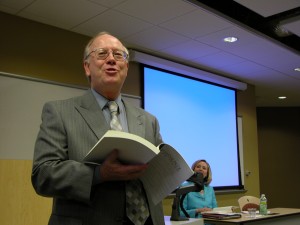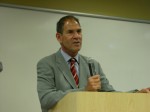As we reported last week, Interim Dean Gene Clark has left the Phoenix School of Law.
Clark came to the school as a legal innovator and lover of classical learning, and he spoke highly of the school’s attempt to foster student-centered education. As he told us in 2009:
“Most law schools are heading in the direction we are; we are just a little bit further from the beginning. U.S. legal education is at a great threshold moment, making significant changes. We have a 19th-century model and produced a great 19th-century lawyer. But if you think about the Socratic method, it was before Piaget, it was before Dewey, it was before any notion of developmental learning or the effective component in learning—no surprise that it needed some change. We’re excited because we can be at the forefront of bringing that change about.”
This is not the first sudden departure of leaders at Phoenix Law. In January 2009, Dean Dennis Shields left the school with no advance notice to the public or students. Just the week before Shields’ departure, his office had confirmed an interview with Arizona Attorney Magazine. Four days after the surprise announcement, Interim Dean Eugene Clark was present for the interview.
In that interview, Clark was asked about what appeared to be a sudden departure of the previous dean. He said, “In our organization, there was a feeling it would be a good idea to move people around to create interdependence, that if we’re going to do cross-consortium things and leverage, it’s good to have people know each other.”
Here is the story we’ll run in the July/August issue of Arizona Attorney.
Gene Clark To Leave Phoenix School of Law
The Phoenix School of Law announced on June 24 that its Interim Dean, Gene Clark, would step down, effective Monday, June 28. Professor Ann Woodley was slated to take over as Interim Dean until a permanent Dean is named later in the summer.
Clark planned to leave the school immediately and travel to Australia on June 28, where he will teach corporate law and advise doctoral students at Griffith University.
Phoenix Law is part of the InfilLaw system, a private umbrella company that is comprised of the Phoenix school and two other schools, Florida Coastal School of Law and the Charlotte (North Carolina) School of Law. InfiLaw is owned by Sterling Partners, a private equity firm.
 Phoenix Law spokeswoman Juliet Falevitch said that Clark “will become the first InfiLaw provost, while trying to get international ties for InfiLaw and the law school system.”
Phoenix Law spokeswoman Juliet Falevitch said that Clark “will become the first InfiLaw provost, while trying to get international ties for InfiLaw and the law school system.”
In leaving Phoenix Law, Clark also withdrew himself from consideration as the school’s Dean. The search for a permanent administrator has lasted throughout Clark’s time there from January 2009. It is expected that a new Dean will be named within the month.
Clark’s biggest accomplishment at Phoenix Law will likely be remembered as his leadership in securing full ABA accreditation for the school, which was founded in 2005. The school landed the accolade on June 15, earning its new status at the earliest opportunity at which it could apply—less than six years from opening.
On his watch, the school also garnered a Law School Admissions Council “Diversity Matters Award” this year for its efforts to attract students from racial and ethnic groups underrepresented in the legal profession.
Two weeks ago, Clark spoke proudly about the school’s graduates, who had earned the highest pass rate of all three Arizona law schools on the most recent Arizona Bar Exam. He added that Phoenix Law had the highest number of test-takers, so it was not an anomaly of a small set of accomplished students.
Among his other duties, Dean Clark had been a member of the State Bar Board of Governors. Of the Bar, he said, “I have never seen a bar association so willing to partner with a school. They gave our growing school a great reception, and we all appreciated it.”
Bar President Alan Bayham Jr. spoke highly of the departing scholar, praising him as “a gifted communicator,” Bayham also noted Clark’s leadership in diversity and in helping to found a legal clinic for veterans.
“Gene Clark and his service on the Board of Governors will be missed,” said Bayham. “He was always willing to share his expertise in the education and training of lawyers, and willing to provide assistance to the bar and the community. Most of all, we will miss his good humor, wit and always positive attitude.”
Since Clark arrived on campus in 2009, he has been a candidate for the permanent dean position. It had been expected that gaining ABA accreditation would help ensure his selection.
After the announcement of his departure, Clark spoke with Arizona Attorney. He said that some people—such as himself—may have the skill set to get a school up and running, but different skills may be needed to get it to the next level.
“In some ways I am better suited to the start-up phase than I am to the adolescent years and maturity.”
Asked what he believed the school’s next steps will be, he gave a broad list, including locating the most effective site for the school, finding areas of specialization, and strengthening the partnership between faculty and academic success staff to improve career placement. He also said the school will ramp up its clinical offerings, in taxpayer assistance, veterans’ issues, family law and immigration.
Clark previously served as Dean of the Charlotte School of Law since its 2006 founding. He now returns to a continent he knows well, having been Dean and a Professor at Charles Darwin University in Australia and Head of School (Law) at the University of Canberra, where he also served as Vice-Chancellor. He also has taught at the University of Tasmania in Australia.
He heads to the Gold Coast campus of Griffith University, in Southport, Queensland. The campus opened in 1975. Its website describes Griffith as “one of the most influential universities in the Asia-Pacific region.”
Clark, 62, looks forward to joining family in Australia and “getting fit, walks on the beach, time to have quiet time to reflect.” His wife, who has been offered a professorship at Griffith, is already there, as is one of his daughters. Another adult daughter will remain in the United States.
He said he is excited about increasing his teaching. “Even as a dean, the driver, the frame at which I approached it was always at that engagement of teaching.”
“Teaching is probably one of the most worthwhile human activities. I’m just lucky that someone wants to pay me for it.”
Clark earned his B.A. at St. Mary of the Plains College in Dodge City, Kan. He later was awarded master’s degrees at Wichita State University and the University of Tasmania, a J.D. at Washburn University, and a Ph.D. at the University of Tasmania. His wife Pat is an accounting professor, and they have two grown daughters, Remy and Lisa.
Read our March 2009 Q&A with Dean Clark.
Here is more information on InfiLaw.






